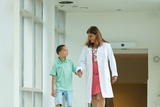Cardiovascular Exercise Physiology Laboratory

Our Cardiovascular Exercise Physiology Laboratory at Children's Hospital of Philadelphia (CHOP) provides testing and rehabilitation to children and teens with heart disease.
Our lab is the largest of its kind in the country. We are experts in cardiovascular exercise and heart disease and perform more than 2,000 diagnostic tests each year. We use advanced testing equipment to provide a complete cardiovascular, pulmonary and metabolic evaluation for your child.
We also provide inpatient and outpatient rehabilitation services. Our team uses the latest technology to monitor and evaluate the body’s response to exercise. In our state-of-the-art rehab gym, your child will have access to a variety of exercise equipment to best meet their unique needs.
How we serve you
Part of one of the largest pediatric cardiac centers in North America, we collaborate with programs across the Cardiac Center to best meet your child's needs.

Meet your team
Your child will be cared for by an accomplished team of pediatric cardiology experts and clinical exercise physiologists. We make sure your child gets the highest level of care and support.

Cardiovascular Exercise Physiology Laboratory locations
Access our experts in cardiovascular exercise and heart disease.

Cardiac Center resources
We know that caring for a child with a heart condition can be stressful. To help you find answers to your questions – either before or after visiting the Cardiac Center – we’ve created this list of educational health resources.


